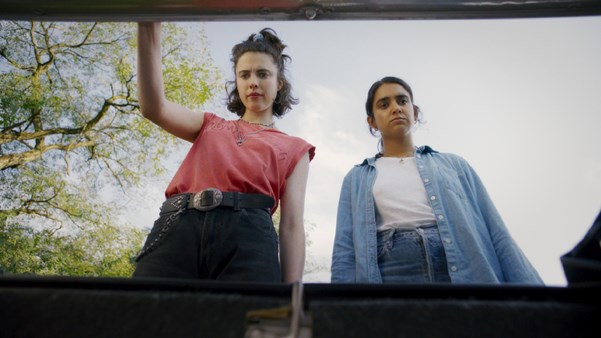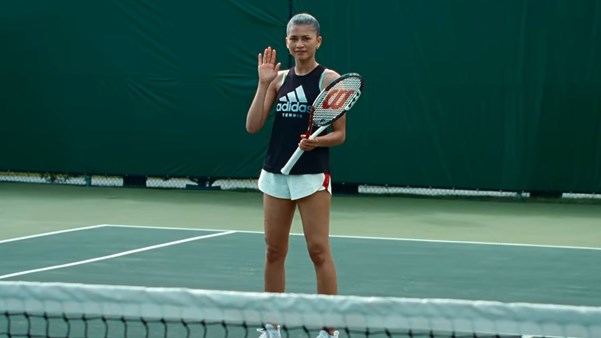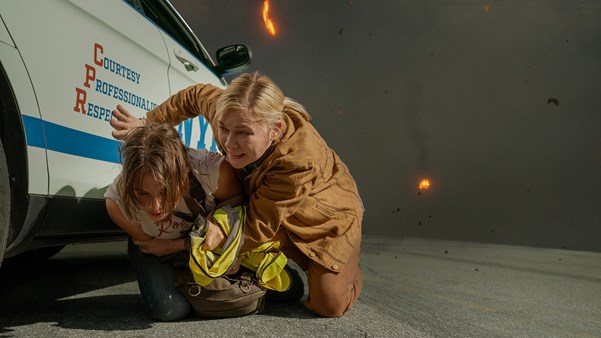Billie Walker investigates the ways in which Rose Glass’ lesbian crime thriller subverts conventional genre tropes, from romantic jealousy and gendered violence to latent machismo.

When a new crime thriller is released, we can hazard a guess as to what to expect: blood, sweat and bullets. Directed by Rose Glass, and co-written with Weronika Tofilska, Love Lies Bleeding has all of this but, as its queer love affair between Lou (Kristen Stewart) and Jackie (Katy O’Brian) steams up, the film departs from genre conventions. It leaves the heterosexual couplings of Blood Simple (1984) and True Romance (1993) in the dust, instead creating a fresh perspective on well-worn territory.
When gym manager Lou and bodybuilder Jackie fall hard and fast, their tough exteriors and aggressive temperaments get in the way of their dreams, and the movie details how their violent pasts complicate their present. Like any good crime-thriller pairing, this couple’s desperate need to move forward only seems to get them in more trouble. They share some similarities with the crime couple Clarence (Christian Slater) and Alabama (Patricia Arquette) of True Romance (1993), in that their devotion and domestic intimacy is similarly instantaneous, a one night stand becoming, by morning, a lifelong dedication.
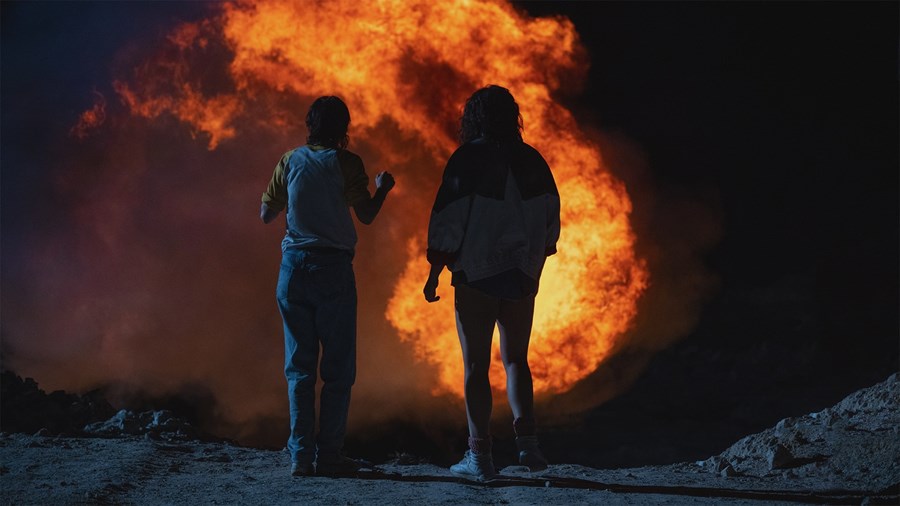
Love Lies Bleeding (2024)
But Jackie and Lou truly are the natural successors to the timeless sapphic duo of the Wachowskis’ Bound (1996), Violet (Jennifer Tilly) and Corky (Gina Gershon), because they too are a queer couple seeking an escape from the confines of violent patriarchy they find themselves in. However, Love Lies Bleeding’s unique casting allows for a rarely seen on-screen lesbian dynamic, that of the skinny butch and the muscular femme, which may surprise straight viewers, but the queer women in every audience will appreciate the rarely explored binary-resisting representation.
Just because Love Lies Bleeding centres around two queer women doesn’t mean it is any less pumped with machismo and testerone. Lou encourages Jackie to use steroids, which strengthens their codependency, as well as the latter’s muscles and building anger. It also reflects classic, masculine-coded behaviours. At the beginning of Pumping Iron, the 1977 documentary about the world of professional bodybuilding, Arnold Schwarzenegger is coached by a ballet teacher on how to pose and move his body. O’Brian borrows these moves to show off Jackie’s taught, muscular frame; she is at once graceful and strong, which is all Lou could ever want.
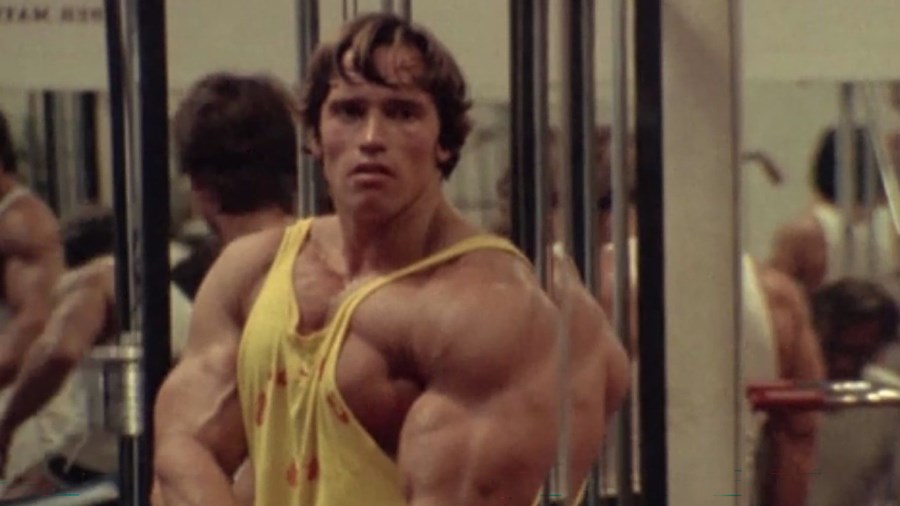
Pumping Iron (1977)
Lou quickly dedicates herself to Jackie’s growing physique, providing support and performance-enhancing drugs. This muscle worship becomes the central foundation upon which Love Lies Bleeding is built. Lou’s commitment to Jackie’s body is shown in an intense training montage: egg yolks and shells fill the bin, and Jackie’s weightlifting is a pulsing constant. But this isn’t just any training montage. Mixed in with these traditional images of strict diets and physical exertion – that we’d expect from a boxing movie – are queer moments of ecstasy. Lou licks chocolate protein shake off Jackie’s rock-hard chest, and moans as Jackie nestles her head between her legs.
Lou, a woman partial to Pat Califa’s BDSM short-story collection Macho Sluts (1988), is living her fetish fantasy. But the growing intimacy Glass dedicates to the first act of Love Lies Bleeding demonstrates that Lou’s obsession goes beyond satisfying a kink. With her fingers deep inside her lover, Lou confesses, ‘I wanna see how far you can go’, hoping to test Jackie’s muscles – and her limits in love. Lou and Jackie’s bond may be unique, but pushing romantic boundaries is commonplace in the type of crime thriller Love Lies Bleeding heralds from.
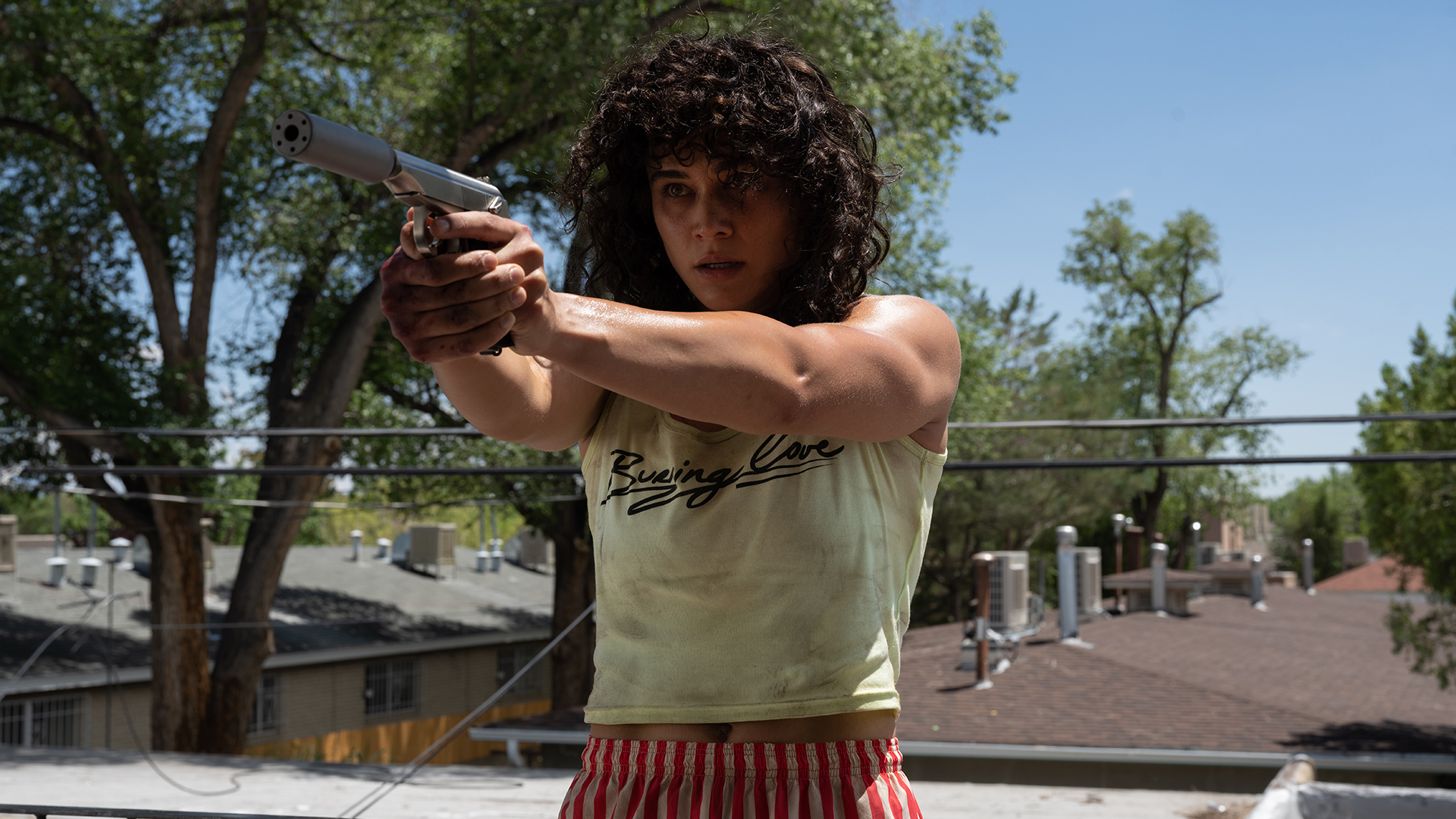
As is a certain visual aesthetic. It is clear that Love Lies Bleeding cinematographer Ben Fordesman was influenced by the Coen Brothers’ seedy thriller Blood Simple, in which Marty’s (Dan Hedaya) need for revenge on his cheating wife Abby (Frances McDormand) and her lover Ray (John Getz) leads to a bloody mess of miscommunications. Blood Simple’s director of photography Barry Sonnenfield traces the wide empty roads of small-town Texas, a place so thinly populated you can get away with murder. Fordesman mimics these wide shots in Love Lies Bleeding as headlights bear down on the tarmac of rural New Mexico roads, reflecting the genre’s visual history back on itself. Pair this with aerial images of the canyons, that, with the layered depth, evoke the vulvic paintings of Georgia O’Keeffe, and the ranges are like Lou and Jackie’s fraught love. The deeper in you go, the more secrets you uncover.
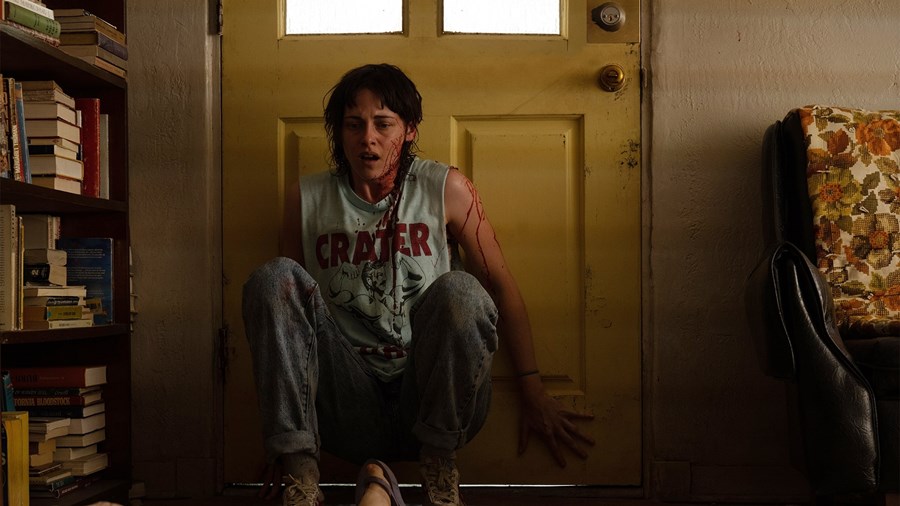
Love Lies Bleeding (2024)
But every honeymoon phase must come to an end, and jealousy and infatuation are an often vicious pairing for the testosterone-addled mind. As with many crime couples that came before them, a grudge builds when Lou learns of Jackie’s sexual past with her brother-in-law JJ (Dave Franco), and the news threatens their bond. It’s a possessive moment that brings crime fans back to Clarence’s thirst for vengeance against Alabama’s ex-pimp Drexl (Gary Oldman) in True Romance, or Marty’s cuckolded bloodlust in Blood Simple. Jackie and Lou's first fight as a couple begins within the typical hetero-monogamous confines of jealousy that we’ve seen played out many times before – with disastrous results.
Quickly, as if these scenes of scorned lovers play across her mind, Lou reevaluates her repulsed reaction to Jackie’s sexual past. Rather than succumbing to the possessiveness that sets men of crime thrillers past on a destructive course, Lou recognises her anger stems from JJ’s abusive control over her sister Beth (Jena Malone), who he beats mercilessly. It’s then that Lou and Jackie’s violent actions reflect those of Thelma & Louise (1991), as they take justice into their own hands. The reality of gendered violence is a common theme of the crime thriller, as women are often attacked on and off screen. Thelma’s (Geena Davis) sexual assault is the catalyst that forces her and Louise (Susan Sarandon) to go on the lam. As much as the vengeance at the heart of Love Lies Bleeding is personal, Lou and Jackie’s decision to take matters into their own hands mirrors the justified vigilantism of Thelma & Louise.
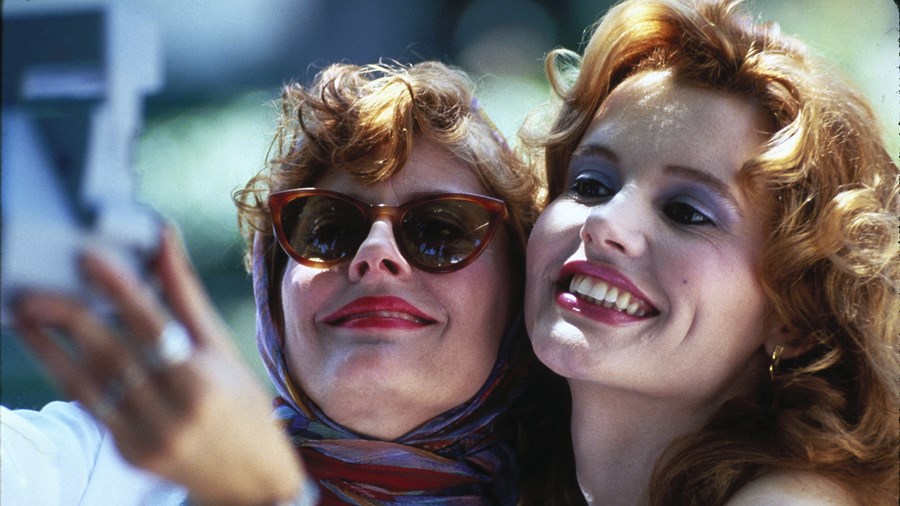
Thelma & Louise (1991)
From her criminal father (Ed Harris), Lou has picked up a tight-lipped and controlling attitude, one she shares with the quiet brooding characters of the genre. Kristen Stewart’s performance feels close to John Getz’s as Ray in Blood Simple. Lou has a history of violence, that flashes in snippets of neon red before our eyes. It leads her to believe the ‘less you know, the better’ attitude is the best way to handle risky situations, but as Ray discovers, this lack of clarity only leads to further bloodshed. Lou and Jackie’s tendency towards stubbornness – which matches the denim-clad Ray and other familiar, crime-thriller figures whose intractableness leads them into criminality – demonstrates the ripple effects of the machismo they have both adopted in order to survive. And it’s ultimately this toxicity that causes their breakdown in communication, violently raising the stakes for all involved.
The queer woman is often undermined in crime thrillers. Whether that be Violet’s husband Caesar (Joe Pantoliano) underestimating Corky as a threat to his marriage in Bound, or the way the gangsters of True Romance are ashamed to perform oral sex on a woman. Misogyny and homophobia run deep in these violent characters, but in making Love Lies Bleeding, writers Glass and Tofilska wanted more than just another queer tale of identity. Queer intimacy takes centrestage, while homophobia is a brief interlude to the real blood-pumping thrills. Love Lies Bleeding may borrow from the genre’s playbook, but these strong unconventional female leads make Rose Glass’ sophomore film a new milestone for the cinema of the criminal underworld.
WATCH LOVE LIES BLEEDING IN CINEMAS


